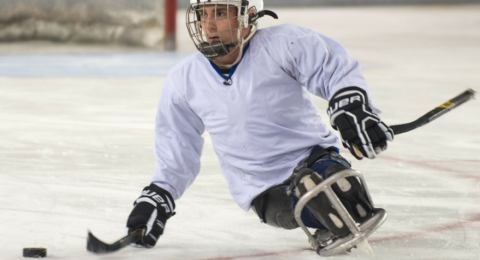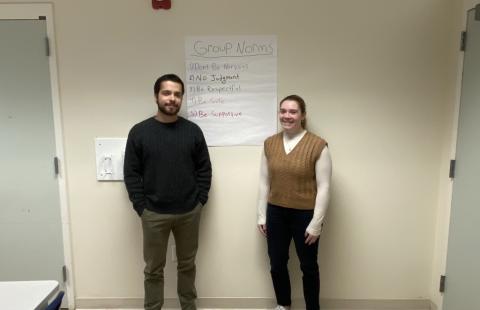What is a Minor in Disability Studies?
The minor in Disabilities Studies gives students the opportunity to explore the meaning, nature and consequences of disability from multiple perspectives. Ways of supporting people with disabilities and their families is addressed including the influences of disability policy, applications of technology, and societal and cultural attitudes and understanding related to persons with disability. This interdisciplinary program introduces topics such as exceptionality, the lived experience of disability and effects of stigma, disability policy, assistive technologies and universal design to enhance function and access, and health and human services for supporting individuals with disability. Students select from a wide range of electives to support their individual areas of interest. Students may expand career options by combining the minor in Disability Studies with majors such as Education, Occupational Therapy, Recreation Management and Policy, Psychology, Human Development and Family Studies, Communication Sciences and Disorders, Kinesiology, and Social Work.
Why Enroll in the Minor in Disability Studies at UNH?
When you minor in Disability Studies at UNH, depending on how you design your program and your course selection, you may work collaboratively with faculty from the Departments of Occupational Therapy, Recreation Management and Policy, Communication Sciences and Disorders, Social Work, Nutrition, Kinesiology, Human Development and Family Studies, and Education. You’ll also have the option of pursuing a faculty sponsored independent study or a small-scale research project.
Potential career areas
- Early Intervention and Child Care
- Education/Special Education
- Mental Health Services
- Recreation
- Rehabilitation
- Health Management and Policy
- Health and Human Services
From the CHHS Blog
Curriculum & Requirements
The minor in Disability Studies gives students the opportunity to explore the meaning, nature and consequences of disability from multiple perspectives. Ways of supporting people with disabilities and their families is addressed including the influences of disability policy, applications of technology, and societal and cultural attitudes and understanding related to persons with disability. This interdisciplinary program introduces topics such as exceptionality, the lived experience of disability and effects of stigma, disability policy, assistive technologies and universal design to enhance function and access, and health and human services for supporting individuals with disability. Students select from a wide range of electives to support their individual areas of interest. Students may expand career options by combining the minor in Disability Studies with majors such as Education, Occupational Therapy, Recreation Management and Policy, Psychology, Human Development and Family Studies, Communication Sciences and Disorders, Kinesiology, and Social Work.
When you minor in Disability Studies at UNH, depending on how you design your program and your course selection, you may work collaboratively with faculty from the Departments of Occupational Therapy, Recreation Management and Policy, Communication Sciences and Disorders, Social Work, Nutrition, Kinesiology, Human Development and Family Studies, and Education. You’ll also have the option of pursuing a faculty sponsored independent study or a small-scale research project.
Academic policies related to Minors.
| Code | Title | Credits |
|---|---|---|
| Required Course | ||
| One of the following courses is required from the student's major or any other disability related intensive course outside of the major with permission: | ||
| OT 610 | Occupation, Identity, Disability | 4 |
| OT 685 | Psychosocial Disorders and Everyday Life | 4 |
| EDUC 650 | Introduction to Disability in Inclusive Schools and Communities 2 | 4 |
| RMP 501 | Diversity, Equity, Inclusion, and Justice for Recreation Services | 4 |
| SW 712 | Understanding Developmental Disabilities | 4 |
| Electives | ||
| Select 16 credits from the course list below: Note that any of the courses in the required course list above may be used as an elective course if not taken as the required course | ||
| OT 444 | Living and Doing with Technology | 4 |
| INTR 438 | A Socio-cultural Perspective on the Deaf Community | 4 |
| NUTR 740 | Nutrition for Children with Special Needs | 4 |
| OT 730 | Assistive Technology for Enhancing Occupational Performance | 3 |
| OT 733 | Assistive Technology for Physical Access I: Electronic Technologies | 2 |
| OT 734 | Assistive Technology for Physical Access II: Mobility, Seating, and Transportation | 2 |
| OT 735 | Assistive Technology for Communication and Cognition | 2 |
| OT 736 | Assistive Technology for Vision and Hearing | 2 |
| OT 520 | Happy and Healthy at Work: Promoting Wellness, Diversity and Inclusion | 4 |
| HMGT 520 | Happy and Healthy at Work: Promoting Wellness, Diversity and Inclusion | 4 |
| EDUC 760 | Introduction to Young Children with Special Needs | 4 |
| RMP 444A | Taking the "Dis" out of Disability | 4 |
| RMP 720 | Adaptive Sport Facilitation for Recreation Therapy and Related Professions | 4 |
| SW 704 | Adolescents with Emotional and Behavioral Challenges | 4 |
| HPE 781 | Introduction to Adapted Physical Education | 4 |
SW, OT, EDUC, KIN, NUTR, RMP Independent Study with a disability focus 1 | ||
- 1
The purpose of the independent study is to explore a topic that provides a detailed focus on an important issue related to individuals with disabilities. A student may also choose to engage in a small-scale research project to investigate an issue that affects individuals with disabilities. Each project will be negotiated with the student's departmental faculty adviser and the coordinator of the minor program.
- 2
Prerequisite courses EDUC 500 Exploring Teaching and EDUC 402 Introduction to Educational Studies: Social Change and Education in Local and Global Contexts are waived with permission for students in non-education majors.







